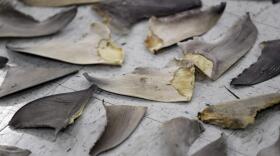-
New research suggests that inbreeding may be a key reason that the Pacific Northwest's endangered population of killer whales—like the Miami Seaquarium's Lolita— has failed to recover despite decades of conservation efforts.
-
The population of an endangered bird, the Everglade snail kite, has rebounded recently. Scientists it's all thanks to an invasive snail that has provided kites with a new abundant food source.
-
ST. PETERSBURG, Fla. (AP) — The ungainly yet graceful wood stork, which was on the brink of extinction in 1984, has recovered sufficiently in Florida and other Southern states that U.S. wildlife officials proposes removal of the wading bird from the endangered species list.
-
The Hendrie Ranch in Highlands County sold a 661-acre conservation easement along the Florida Wildlife Corridor, which will benefit the Florida panther
-
“Florida bonneted bats desperately need critical habitat protection, and the Fish and Wildlife Service has excluded crucial areas threatened by development right now,” said attorney Ragan Whitlock with the Center for Biological Diversity.
-
State wildlife officials approved a seasonal no-entry zone in an area of Brevard County waters where manatees gather in effort to provide more protections to the sea cows.
-
Environmental groups are asking U.S. wildlife officials to return manatees to the endangered species list four years after they were downlisted to threatened, as hundreds continue to die mainly from pollution-caused starvation.
-
The U.S. Fish and Wildlife Service is listing the penguins native to Antarctica as a threatened species under the Endangered Species Act.
-
The court's decision reopened a lawsuit that invalidates a protected area in Brazil's Amazon.
-
A spate of recent criminal indictments highlights how U.S. companies, taking advantage of a patchwork of federal and state laws, are supplying a market for shark fins that activists say is reprehensible.
-
Scientists face a challenge: A troubled species rebounds thanks to restoration efforts, only to make things worse for others by preying on them or outcompeting them for food and living space.
-
The organizations say the federal agency failed to consider the impacts deep sea aquaculture would have on threatened and endangered species.
Play Live Radio
Next Up:
0:00
0:00
Available On Air Stations












